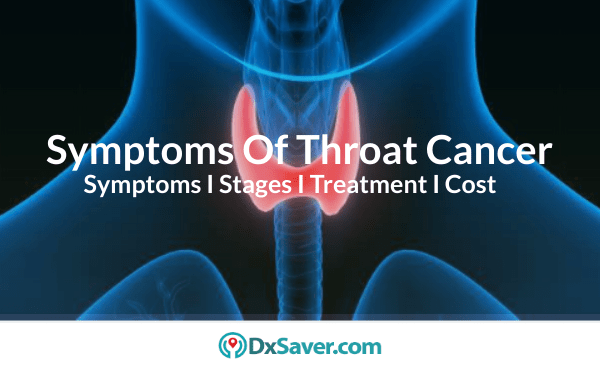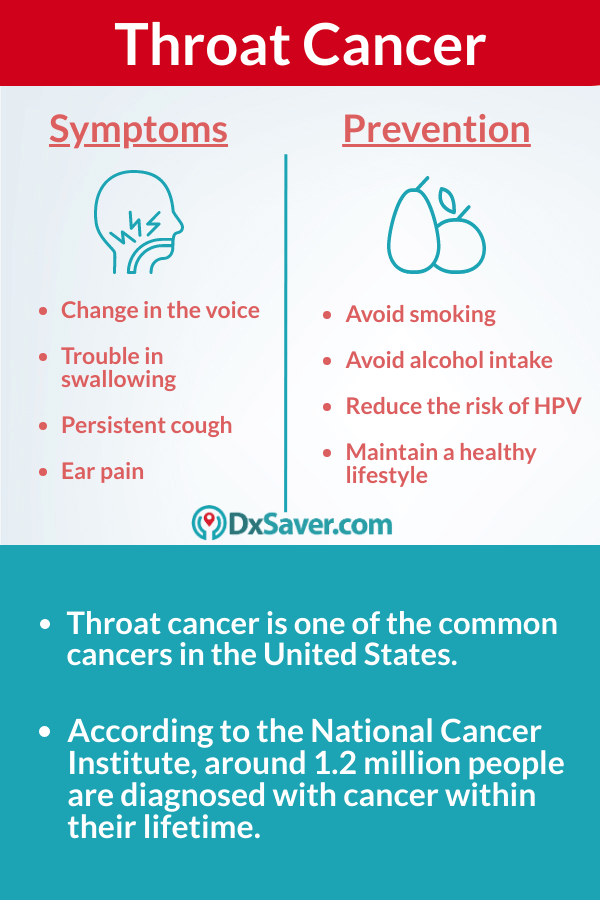
Cancer is a group of various diseases, in which abnormal or old cells multiply and divide uncontrollably in your body. These abnormal/old cells then form into malignant growths called tumors. Throat cancer refers to cancer that affects the voice box, the vocal cords, and other parts of the throat that includes the tonsils and oropharynx. Throat cancer is of two categories and they are pharyngeal and laryngeal cancer.
Throat cancer is an uncommon disease as compared to other cancers. According to the National Cancer Institute, about 1.2 percent will be diagnosed with oral cavity and pharyngeal cancer and 0.3 percent will be diagnosed with laryngeal cancer within their lifetime in the United States. So we highly recommend every individual to get tested for Throat can at least once in a year.
The below article covers all relative topics of throat cancer like symptoms of throat cancer, throat cancer causes, types, stages, its treatment, where to get tested, and prevention.
- Symptoms & signs of throat cancer
- Throat cancer causes
- Types of throat cancer
- Throat cancer stages
- Is throat cancer curable?
- Throat cancer treatment
- Prevention
- How to get tested?
- Providers Locations
Symptoms of throat cancer
Symptoms of throat cancer are not shown at an early stage so it becomes difficult to detect. Some of the common signs and symptoms of throat cancer may include:
- Change in the voice
- Trouble in swallowing
- Hoarseness
- Sudden weight loss
- Sore throat
- A constant need to clear the throat
- Persistent cough or cough up blood
- Swollen lymph nodes in the neck area
- Wheezing
- Ear pain
Immediately consult your physician if you notice any new signs or symptoms that are persistent. Symptoms of throat cancer aren’t specific to cancer, so your physician will investigate other more common causes first.
Throat cancer causes
Mostly, men develop throat cancer than women. Few lifestyle habits may increase the risk of developing cancer in the throat, it includes:
- Smoking
- Excessive alcohol consumption
- Poor nutrition
- Poor dental hygiene
- Genetic syndromes
Throat cancer is also associated with human papillomavirus infections or HPV. HPV is one of the common sexually transmitted viruses. According to the Cancer Treatment Centers of America, HPV infection is a risk factor for certain oropharyngeal cancers.
Throat cancer has also been linked to other cancers. In fact, few individuals diagnosed with throat cancer are diagnosed with esophageal cancer, lung cancer, or bladder cancer at the same time. The reason is, these cancers have some of the same risk factors.
Types of throat cancer
Most of the throat cancers have the same types of cells. The below mentioned specific terms are used to differentiate the part of the throat where cancer originated.
- Nasopharyngeal cancer– This type of begins in the nasopharynx, the part of your throat just behind your nose.
- Oropharyngeal cancer– In this type, cancer begins in the oropharynx, right behind your mouth that includes your tonsils.
- Hypopharyngeal cancer- This cancer begins in the hypopharynx, which is just above your esophagus and windpipe.
- Glottic cancer– It occurs in the vocal cords.
- Supraglottic cancer– This type of cancer occurs in the upper portion of the larynx and also affects the epiglottis, a piece of cartilage that blocks food from going into the windpipe.
- Subglottic cancer– This cancer begins in the lower portion of your voice box, below your vocal cords.
Throat cancer stages
If your physician finds cancer cells in the throat, they will order additional tests to identify the stage, or to which extent cancer has spread. The throat cancer stages from 0 to 4:
- Stage 0: The tumor occurs only on the top layer of cells at the affected part of your throat at this stage.
- Stage 1: During this stage, the tumor is less than 2 cm and it is limited to the throat where it started.
- Stage 2: The tumor is from 2-4 cm that means it may have grown into nearby areas at this stage
- Stage 3: The tumor is longer than 4 cm that means it has grown into other structures in the throat and has spread to one lymph node.
- Stage 4: At this stage, the tumor has spread to the lymph nodes and the distant organs.
Is throat cancer curable?
Throat cancer is a term that applies to cancer that develops in the throat. The throat or the voice box is closely connected, with the voice box located just below your throat.
If throat cancer is diagnosed early, it has a high survival rate. Throat cancer may not be curable if the abnormal cells spread to other parts of the body beyond the neck and head. However, those who have diagnosed can continue treatment and slow the progression of the disease.
Throat cancer treatment
Treatment options for throat cancer are surgery, radiation therapy, and chemotherapy. The treatment method recommended by your physician depends on the stage of your disease and how much it has affected your throat.
Surgery
If the tumor in your throat is small, your physician may surgically remove the tumor from the throat. This surgery is only done in the hospital by your physician while you’re under sedation. Your physician may recommend one of the following surgical processes:
- Endoscopic surgery
- Neck dissection
- Cordectomy
- Laryngectomy
- Pharyngectomy
Radiation Therapy
Once the tumor is removed, your physician may proceed with radiation therapy. Radiation therapy uses high-energy rays to destroy the cancer cells from the throat or from the other organs. It targets any cancer cells left behind the tumor. Types of radiation therapy are:
- Intensity-modulated radiotherapy & 3D-conformal radiation therapy
- Brachytherapy
Chemotherapy
Chemotherapy is a drug that kills and slows the growth of abnormal cells. Your physician may recommend chemotherapy when large tumors and tumors that are spread to the lymph nodes and other organs. They may also recommend radiation therapy.
Targeted therapy
Targeted therapies are drugs that stop the spread and growth of cancer cells pr tumors by interfering with particular molecules that are responsible for the growth of the tumor. One of the types of targeted therapy used to cure throat cancer is cetuximab.
Other types of targeted therapy are being researched by the researches. Your physician may recommend this therapy along with standard chemotherapy and radiation therapy.

Prevention
There are no proper ways to prevent throat cancer, but you can take steps to reduce the risk of spreading:
- Stop smoking: Use nicotine replacement products to quit smoking, or talk to your doctor about prescription medications to help you quit smoking.
- Reduce alcohol intake: Men should not consume more than two alcoholic drinks per day; similarly, women should not consume more than one alcoholic drink per day.
- Maintain a healthy lifestyle: Eat plenty of fruits and vegetables, and also take meats. Reduce fat and take steps to lose weight. Engage in physical activity at least 4 days a week.
- Reduce your risk of HPV: HPV has been linked with throat cancer. To protect yourself from this virus, practice safe sex. Also, discuss with your physician the benefits of the HPV vaccine.
Other topics you may be interested in:-
- Lung Cancer Stages, Causes, Symptoms & Treatment
- Top 10 Best Diet to Lose Weight
- Signs and Symptoms of Oral Syphilis
- Is Itching a Symptom of STD?
- Planning for a Baby? Then look out for These Hormones
- Cost of CT Scan Test in the U.S.
- Cost of MRI Scan Test in the U.S.
- Cost of Lymphocyte Blood Test in the US
- GGT, Gamma-GT Blood Test Cost in the US
- Importance of CA 125 Testing & Ovarian Cancer in Women
- C-Peptide Normal Levels, Test Results & Treatment
- Colon Cancer Stages, Early Symptoms, Causes & Treatment
- What are the types of skin cancer?
- Types of STDs that cannot be cured
- Herpes Vs. HPV: Differences, Symptoms, and Testing Cost
- What is creatinine in blood? Know more about the creatinine test cost near me
- Symptoms of Pancreatic Cancer, Causes, Diagnosis & Treatment
- Oral STDs: Names, Symptoms, Treatment and Testing Cost
- Estradiol (E2) Hormone: Normal Levels, Importance in Women Fertility and Testing Cost